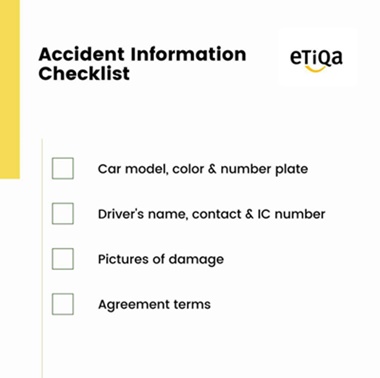Your Complete Guide to Road Accident Management in Malaysia

Have you ever been in a road accident or know someone who’s had an unfortunate experience? The number of road accidents as reported by the Ministry of Transport Malaysia has steadily increased to a worrying level from 2010 to 2019. Looking at these numbers, it’s important to understand that no matter how cautious you are, accidents happen. To ensure you manage the situation effectively, here’s a guide on road accident management made for all drivers in Malaysia.
Check yourself
Before worrying about the situation or jumping out to check your car, take a minute to gather yourself mentally and emotionally. Stay calm and check to see if you have sustained any injuries. For severe injuries, it’s best not to move and call for help. For minor scrapes and cuts, take a deep breath and ensure your safety first. This means moving your car to the side of the road and informing someone you trust about the situation including your exact location.
Gather Information
As a result of the shock of the situation, many people tend to forget what information they need from the other person involved. Here’s a list of details you will need to file a report about your road accident.
- Car details: number plate, color, model and year
- Driver’s details: name, phone number and IC or passport number
- Pictures of damage
- Witness details: name and phone number, if any

Pro tip: keep this list in your car so you can be prepared and won’t have to worry if you’ve missed out on any details.
An Agreement
After assessing the damage to both your vehicles, come to an agreement on how you’d like to proceed. If the other person seems reasonable and the damage is minimal, you can opt to sort it out amongst yourselves. If the accident was your fault, keep in mind that it might be cheaper to pay for the repairs than to make an insurance or takaful claim and lose your no-claim discount (NCD) benefit.
Did you know a road accident that occurs from one car hitting another from the back immediately becomes the fault of the driver at the back? Regardless if it was truly their fault or not, it is a driver’s responsibility to ensure they keep a sufficient distance from the vehicle in front of them.
Road Accident Report

If the damage is severe or if you are unable to come to an agreement, head to the nearest police station and file a report within 24 hours. You will be required to fill in the details listed before, narrate the accident and an officer will take pictures of the damage to complete the report. If you’re worried that the other person refuses to make a report, don’t worry! As long as you have the necessary details, the police will assist with contacting them.
Contact Your Insurance or Takaful Provider
Should you require road assistance, check with your insurance or takaful provider for your required services. Whether it’s towing, replacing a tyre or if you need to locate an approved workshop for repairs. (Ahem, did you know you get free assistance, including up to 200km towing with a plan from Etiqa?)
Additionally, you will be able to inform them of the accident and get advice on how to proceed if you need to make a claim. Should that be the case, an insurance adjuster will contact you to assess the damage and make a conclusion on who is at fault for the road accident. The person at fault will need to claim for damages from their insurance or takaful provider.
Increased Severity

For more severe road accident cases, legal representation might be required. If that’s the case, you would need to hire a lawyer to give you insight to your claim process, paperwork and next steps, based on the cause and severity of the situation.
By reading this, you’ve taken a step towards being prepared for unexpected emergencies. This is one of the best things you can do for yourself and your loved ones. Drive safe, be responsible and always, always wear your seatbelt.
The information contained in this blog is provided for informational purposes only and should not be construed as advice on any matter. Etiqa accepts no responsibility for loss which may arise from reliance on information contained in the article.
